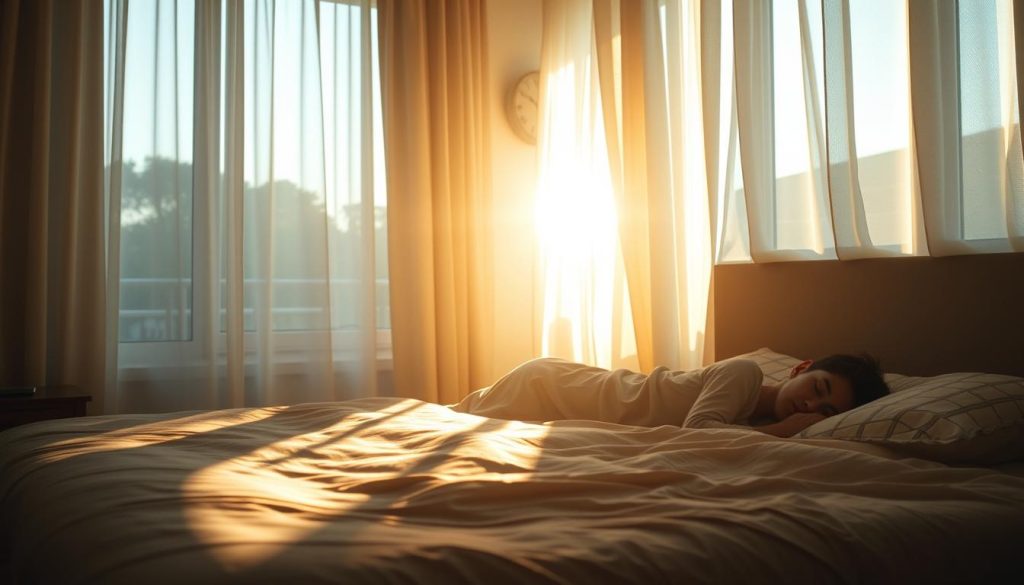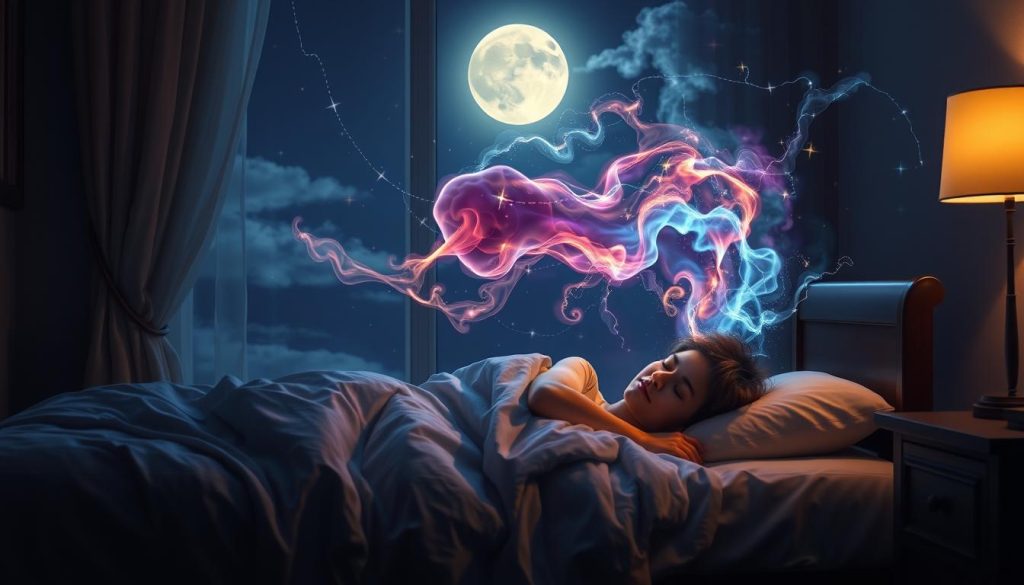Exploring sleep science, I’ve learned that knowing about circadian rhythm and sleep stages is key. These two elements are closely linked and affect how we sleep. By understanding what circadian rhythms are and the different sleep stages, like REM and non-REM, we can improve our health.
This journey helps us see why these concepts matter. It also gives us tools to improve our sleep habits. Let’s dive into the world of sleep science together.
The Basics of Circadian Rhythm
I often wonder about the processes that control my sleep-wake cycle. The circadian rhythm is a natural process that runs on a 24-hour cycle. It controls physical, mental, and behavioral changes. It affects my sleep, hormone release, and overall health.
Understanding my circadian rhythm helps me make better lifestyle choices. It guides my daily routine.
What is Circadian Rhythm?
The circadian rhythm is my body’s natural pattern throughout the day. Genetics and age influence my rhythm. They help me find a routine for better rest and recovery.
Irregular sleep or too much screen time before bed can disrupt it. This can lead to health problems.
The Role of Light in Regulating Circadian Rhythm
Light is key to my circadian rhythm, especially natural sunlight. Sunlight exposure affects melatonin production, the sleep hormone. When I’m in sunlight, my body makes less melatonin, keeping me awake.
As night falls and light fades, melatonin levels go up. This prepares my body for sleep.

| Light Conditions | Effects on Circadian Rhythm |
|---|---|
| Bright Natural Light | Enhances alertness and suppresses melatonin |
| Dull Artificial Light | May confuse the circadian clock, disrupting sleep patterns |
| Complete Darkness | Stimulates melatonin production, encouraging sleep |
| Excessive Blue Light (from screens) | Delays sleep onset and reduces sleep quality |
Knowing how light affects my circadian rhythm helps me make better choices. I try to get more natural light during the day. And I avoid artificial light at night to support my body’s rhythms.
What Are Sleep Stages?
Understanding sleep stages is key to knowing how my body recharges and keeps me healthy at night. Each sleep cycle has different phases, with REM and non-REM sleep being the main ones. These phases are crucial for a good night’s rest.
Different Types of Sleep Stages
Every night, I go through various sleep stages in cycles. These include:
- Non-REM Sleep: This stage has three phases, each important in its own way.
- Light Sleep (Stage 1): This is when I’m still easy to wake up from.
- Moderate Sleep (Stage 2): Here, I relax more, and my heart rate and body temperature drop. It’s good for my health.
- Deep Sleep (Stage 3): This is when my body fixes itself, repairing tissues and building muscle.
- REM Sleep: This stage is marked by fast eye movement and is when I dream most. It helps with memory and emotions.
How Sleep Stages Affect My Rest
The way I move through these sleep stages affects how I feel in the morning. If I’m woken up during REM or deep sleep, I might feel tired or groggy. Knowing about these cycles helps me see why a regular sleep schedule is important for feeling my best.
Circadian Rhythm and Sleep Stages: How They Work Together
The connection between my circadian rhythm and sleep stages is key to my sleep health. My body goes through different sleep stages, affecting how well and when I rest. Knowing this helps me plan my sleep better for recovery and feeling refreshed.
Deep non-REM sleep happens mostly in the first half of the night. It’s crucial for my body to repair and recharge. REM sleep, which is more in the second half, is important for my brain. It helps with memory and emotions.
Keeping a regular sleep schedule helps my body’s natural sleep cycles. Going to bed and waking up at the same time every day improves my sleep. A consistent routine also helps my body smoothly go through sleep stages.

Knowing my circadian patterns helps me understand when I sleep best. Adjusting my daily life to match these patterns boosts my well-being. By understanding the link between circadian rhythms and sleep stages, I can improve my sleep health.
The Importance of REM Sleep
Understanding REM sleep is key to feeling better. This stage is vital for my brain’s functions. It’s when my brain works like it’s awake.
This stage is crucial for many processes. It helps me in big ways.
What Happens During REM Sleep?
REM sleep is when I dream vividly. My brain is very active, and my eyes move fast. My muscles relax, so I don’t act out my dreams.
This stage is also when my body works hard. It helps me remember things and deal with feelings. It shows how important REM sleep is.
The Benefits of REM Sleep for Mental Health
REM sleep is great for my mental health. It helps me handle stress and anxiety better. It makes me stronger emotionally, ready for the day.
By focusing on REM sleep, I improve my mental health. This makes me feel better overall.

Understanding Non-REM Sleep
When I think about sleep, I often overlook the critical role of non-REM sleep stages. These stages are essential for my overall health and well-being. Non-REM sleep can be broken down into different phases, including light sleep and deep sleep. Each phase serves a unique purpose, contributing significantly to how well I feel during the day. Learning more about these stages helps me understand how to optimize my nightly rest.
Stages of Non-REM Sleep
The non-REM sleep stages begin with light sleep, which prepares my body for transitioning into the deeper, more restorative phases. As I progress into deep sleep, my heart rate slows, and my muscles relax. This is where the true magic happens, as my body engages in vital processes like repairing tissues, promoting growth, and balancing hormones. It’s fascinating to recognize that during these non-REM sleep stages, my body is hard at work, facilitating recovery.
How Non-REM Sleep Contributes to Physical Restoration
Understanding the benefits of non-REM sleep makes me more intentional about my sleep habits. During deep non-REM sleep, my immune function is bolstered, enabling my body to fend off illness more effectively. Moreover, this restorative phase aids in muscle recovery, which is crucial for anyone who leads an active lifestyle. By prioritizing non-REM sleep, I can significantly enhance my physical restoration, ensuring I wake up energized and ready to tackle the day ahead.

